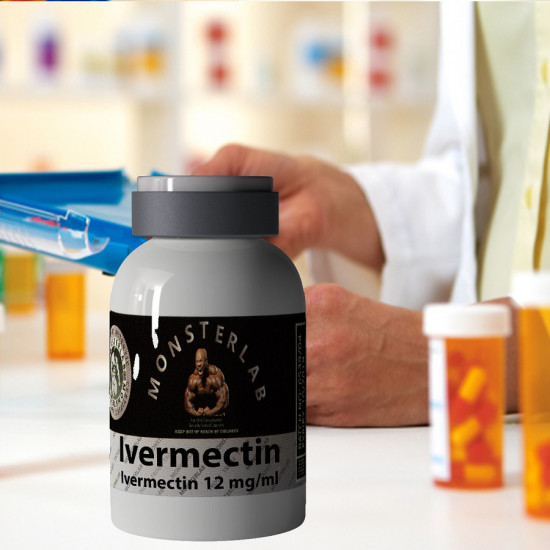Ivermectin




- Stock: In Stock
- Model: Ivermectin covid 19 aniviral
Available Options
Read The Spec Sheet Below Before You Buy Ivermectin : 12mg/ml 100 or 50 ml.
Ivermectin is a Food and Drug Administration (FDA)-approved antiparasitic drug that is used to treat several neglected tropical diseases, including onchocerciasis, helminthiases, and scabies.1 It is also being evaluated for its potential to reduce the rate of malaria transmission by killing mosquitoes that feed on treated humans and livestock.2 For these indications, ivermectin has been widely used and is generally well tolerated.1,3 Ivermectin is not approved by the FDA for the treatment of any viral infection.
Proposed Mechanism of Action and Rationale for Use in Patients With COVID-19
Reports from in vitro studies suggest that ivermectin acts by inhibiting the host importin alpha/beta-1 nuclear transport proteins, which are part of a key intracellular transport process that viruses hijack to enhance infection by suppressing the host’s antiviral response.4,5 In addition, ivermectin docking may interfere with the attachment of the severe acute respiratory syndrome coronavirus 2 (SARS-CoV-2) spike protein to the human cell membrane.6 Ivermectin is thought to be a host-directed agent, which may be the basis for its broad-spectrum activity in vitro against the viruses that cause dengue, Zika, HIV, and yellow fever.4,7-9 Despite this in vitro activity, no clinical trials have reported a clinical benefit for ivermectin in patients with these viruses. Some studies of ivermectin have also reported potential anti-inflammatory properties, which have been postulated to be beneficial in people with COVID-19.10-12
Some observational cohorts and clinical trials have evaluated the use of ivermectin for the prevention and treatment of COVID-19. Data from some of these studies can be found in Table 2d.
Recommendation
- There is insufficient evidence for the COVID-19 Treatment Guidelines Panel (the Panel) to recommend either for or against the use of ivermectin for the treatment of COVID-19. Results from adequately powered, well-designed, and well-conducted clinical trials are needed to provide more specific, evidence-based guidance on the role of ivermectin in the treatment of COVID-19.
Rationale
Ivermectin has been shown to inhibit the replication of SARS-CoV-2 in cell cultures.13 However, pharmacokinetic and pharmacodynamic studies suggest that achieving the plasma concentrations necessary for the antiviral efficacy detected in vitro would require administration of doses up to 100-fold higher than those approved for use in humans.14,15 Even though ivermectin appears to accumulate in the lung tissue, predicted systemic plasma and lung tissue concentrations are much lower than 2 µM, the half-maximal inhibitory concentration (IC50) against SARS-CoV-2 in vitro.16-19 Subcutaneous administration of ivermectin 400 µg/kg had no effect on SARS-CoV-2 viral loads in hamsters. However, there was a reduction in olfactory deficit (measured using a food-finding test) and a reduction in the interleukin (IL)-6:IL-10 ratio in lung tissues.20
Since the last revision of this section of the Guidelines, the results of several randomized trials and retrospective cohort studies of ivermectin use in patients with COVID-19 have been published in peer-reviewed journals or have been made available as manuscripts ahead of peer review. Some clinical studies showed no benefits or worsening of disease after ivermectin use,21-24 whereas others reported shorter time to resolution of disease manifestations that were attributed to COVID-19,25-27 greater reduction in inflammatory marker levels,26 shorter time to viral clearance,21 or lower mortality rates in patients who received ivermectin than in patients who received comparator drugs or placebo.21,27
However, most of these studies had incomplete information and significant methodological limitations, which make it difficult to exclude common causes of bias. These limitations include:
- The sample size of most of the trials was small.
- Various doses and schedules of ivermectin were used.
- Some of the randomized controlled trials were open-label studies in which neither the participants nor the investigators were blinded to the treatment arms.
- Patients received various concomitant medications (e.g., doxycycline, hydroxychloroquine, azithromycin, zinc, corticosteroids) in addition to ivermectin or the comparator drug. This confounded the assessment of the efficacy or safety of ivermectin.
- The severity of COVID-19 in the study participants was not always well described.
- The study outcome measures were not always clearly defined.
Table 2d includes summaries of key studies. Because most of these studies have significant limitations, the Panel cannot draw definitive conclusions on the clinical efficacy of ivermectin for the treatment of COVID-19. Results from adequately powered, well-designed, and well-conducted clinical trials are needed to provide further guidance on the role of ivermectin in the treatment of COVID-19.
Monitoring, Adverse Effects, and Drug-Drug Interactions
- Ivermectin is generally well tolerated. Adverse effects may include dizziness, pruritis, nausea, or diarrhea.
- Neurological adverse effects have been reported with the use of ivermectin for the treatment of onchocerciasis and other parasitic diseases, but it is not clear whether these adverse effects were caused by ivermectin or the underlying conditions.28
- Ivermectin is a minor cytochrome P 3A4 substrate and a p-glycoprotein substrate.
- Ivermectin is generally given on an empty stomach with water; however, administering ivermectin with food increases its bioavailability.
- The FDA issued a warning in April 2020 that ivermectin intended for use in animals should not be used to treat COVID-19 in humans.
- Please see Table 2d for additional information.
Considerations in Pregnancy
In animal studies, ivermectin was shown to be teratogenic when given in doses that were maternotoxic. These results raise concerns about administering ivermectin to people who are in the early stages of pregnancy (prior to 10 weeks gestation).29 A 2020 systematic review and meta-analysis reviewed the incidence of poor maternal and fetal outcomes after ivermectin was used for its antiparasitic properties during pregnancy. However, the study was unable to establish a causal relationship between ivermectin use and poor maternal or fetal outcomes due to the quality of evidence. There are numerous reports of inadvertent ivermectin use in early pregnancy without apparent adverse effects.30-32 Therefore, there is insufficient evidence to establish the safety of using ivermectin in pregnant people, especially those in the later stages of pregnancy.
One study reported that the ivermectin concentrations secreted in breastmilk after a single oral dose were relatively low. No studies have evaluated the ivermectin concentrations in breastmilk in patients who received multiple doses.
Considerations in Children
Ivermectin is used in children weighing >15 kg for the treatment of helminthic infections, pediculosis, and scabies. The safety of using ivermectin in children weighing <15 kg has not been well established. Ivermectin is generally well tolerated in children, with a side effect profile similar to the one seen in adults. Currently, there are no available pediatric data from clinical trials to inform the use of ivermectin for the treatment or prevention of COVID-19 in children.
Clinical Trials
Several clinical trials that are evaluating the use of ivermectin for the treatment of COVID-19 are currently underway or in development. Please see ClinicalTrials.gov for the latest information.




